The Crucial Role of Routine Electrical Maintenance in Adelaide's Commercial Sector
Adelaide, a vibrant and growing city in South Australia, boasts a diverse commercial sector, encompassing a wide range of industries from retail and hospitality to manufacturing and technology. In this bustling metropolis, electrical systems are the lifeblood of businesses, powering daily operations, ensuring safety, and facilitating economic growth. However, to keep these systems running smoothly and safely, routine electrical maintenance is of paramount importance.
The Significance of Routine Electrical Maintenance
Routine electrical maintenance is often an overlooked but vital component of the commercial sector. Its importance cannot be emphasised enough, as it plays a pivotal role in ensuring the longevity, efficiency, and safety of electrical systems. Adelaide's businesses can reap numerous benefits from this practice, including minimised downtime, improved operational efficiency, and significant cost savings. Here's why:
Safety: Regular inspections and maintenance procedures are essential for identifying and addressing potential hazards, thereby reducing the risk of electrical fires and ensuring the safety of both employees and customers.
Operational Efficiency: Proper maintenance optimises the performance of electrical systems, preventing unexpected breakdowns and ensuring that businesses run smoothly without costly interruptions.
Cost-Effectiveness: Proactive maintenance helps identify issues before they escalate, reducing the need for costly emergency repairs and replacements. This approach safeguards businesses from unexpected financial burdens and keeps their operations running smoothly.
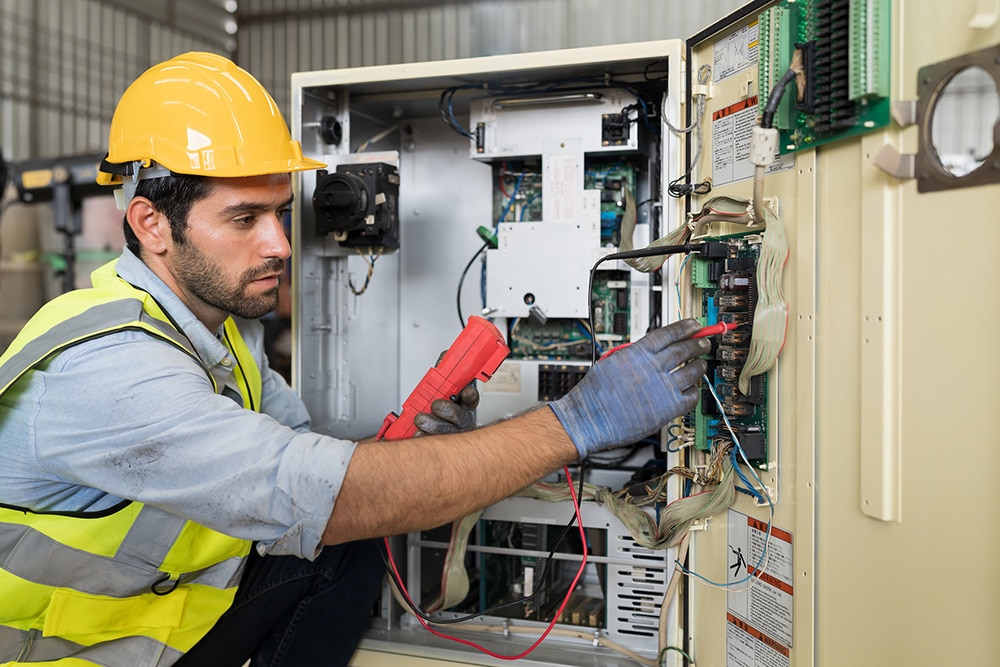
Common Electrical Systems in Adelaide's Commercial Sector
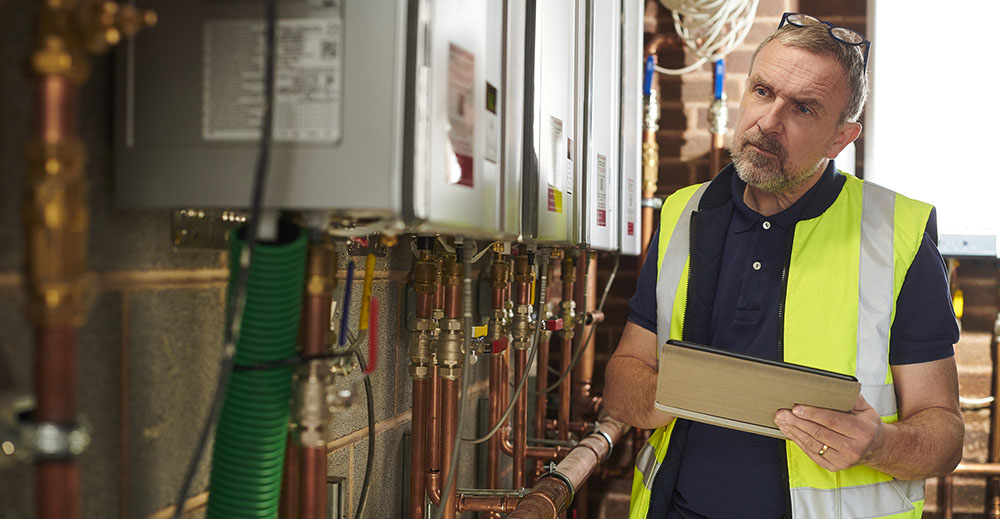
Adelaide's commercial landscape is underpinned by a diverse array of essential electrical systems. These include lighting systems that illuminate workspaces and create welcoming environments for customers. HVAC (heating, ventilation, and air conditioning) systems ensure comfortable temperatures and air quality within commercial buildings, optimising both employee productivity and customer comfort.
In addition to these, security systems play a crucial role in safeguarding businesses and their assets. They include surveillance cameras, access control systems, and alarm systems that help prevent theft, vandalism, and unauthorised access. These systems are integral to providing a secure environment for both employees and customers.
Furthermore, industrial machinery is the beating heart of manufacturing and production businesses in Adelaide. From automated assembly lines to heavy machinery, these systems rely on electricity for efficient and precise operations.
All of these electrical systems collectively form the backbone of daily operations within Adelaide's commercial sector, underscoring the critical need for their uninterrupted functionality to ensure business continuity and customer satisfaction.
Challenges of Inadequate Electrical Maintenance

Neglecting routine electrical maintenance within the commercial sector electric system can have far-reaching and detrimental consequences. The implications extend beyond mere inconvenience, touching upon critical aspects that can significantly impact businesses and their stakeholders.
Financial Losses: Inadequate electrical maintenance can lead to sudden breakdowns and equipment failures, resulting in costly repairs and replacements. These unplanned expenditures can strain a business's budget and hinder its ability to invest in growth and development.
Operational Downtime: The fallout from equipment failures and electrical issues often leads to operational downtime. This disruption can result in lost productivity, delayed projects, and an inability to meet customer demands, ultimately affecting revenue and reputation.
Safety Risks: The safety of employees and customers is paramount. Neglected electrical systems can give rise to hazardous conditions, increasing the risk of electrical fires, electric shocks, or other accidents. Ensuring safety is a moral and legal responsibility for businesses.
Damage to Reputation: Instances of power outages or other electrical failures can tarnish a business's reputation. Customers may lose trust in a company that cannot provide consistent and reliable services, potentially leading to a loss of clientele.
Legal Consequences: In many cases, neglecting electrical maintenance can result in non-compliance with safety regulations and codes. This can lead to legal issues and fines, further impacting a company's financial stability.
Loss of Competitive Advantage: In today's competitive business landscape, efficiency and reliability are key differentiators. A company with a history of inadequate electrical maintenance may struggle to compete effectively in the market.
Environmental Impact: Poorly maintained electrical systems can consume more energy than necessary, contributing to a larger carbon footprint. This not only affects the environment but also increases operational costs.
In summary, the challenges stemming from inadequate electrical maintenance encompass a wide spectrum of issues that extend well beyond mere financial considerations. Businesses must recognise the critical importance of proactive maintenance to protect their bottom line, ensure safety, and maintain a competitive edge in today's marketplace.
Benefits of Regular Electrical Maintenance
Embracing a regular regimen of electrical maintenance in the commercial sector is a strategic investment that yields a wide array of advantages, bolstering both business continuity and financial well-being. Here are these benefits in greater detail:
- Increased Reliability: Regular maintenance serves as a guarantee of the reliability of electrical systems. By addressing minor issues before they escalate into major problems, it ensures that equipment and systems operate consistently. This translates to a smoother, more dependable workflow, helping businesses meet production deadlines and maintain client satisfaction.
- Energy Efficiency: Efficient electrical systems are the backbone of energy conservation. Regular maintenance optimises the performance of these systems, ensuring that they operate at their peak efficiency. As a result, businesses can enjoy reduced energy consumption, which not only leads to lower operational costs but also demonstrates a commitment to environmental sustainability by lowering the carbon footprint.
- Cost Savings: Perhaps the most immediate and tangible benefit of regular electrical maintenance is cost savings. By preemptively identifying and addressing issues, businesses can avoid the steep expenses associated with emergency repairs and replacements. These unexpected costs can wreak havoc on budgets and profitability. With routine maintenance, the financial strain of unplanned repairs is minimised, allowing businesses to allocate their resources more efficiently.

- Extended Equipment Lifespan: Maintenance extends the lifespan of electrical equipment and components. By conducting routine inspections and repairs, businesses can protect their investments and reduce the frequency of equipment replacements. This not only saves money in the long run but also minimises the environmental impact associated with manufacturing and disposing of new equipment.
- Safety Assurance: Regular maintenance is instrumental in identifying and addressing potential safety hazards, reducing the risk of electrical fires, equipment malfunctions, and electric shocks. Ensuring the safety of employees and customers is not just a legal requirement but also a moral obligation for businesses.
- Operational Consistency: With proper maintenance, businesses can operate with confidence, knowing that their electrical systems are reliable. This consistency allows for smoother business operations, enhanced customer service, and an overall better experience for all stakeholders.
In conclusion, the benefits of regular electrical maintenance extend far beyond the immediate financial savings. They encompass enhanced reliability, energy efficiency, extended equipment lifespans, and safety assurance, ultimately contributing to a more competitive and sustainable commercial sector in Adelaide and beyond. By embracing proactive maintenance practices, businesses not only safeguard their bottom line but also ensure their long-term success and positive environmental impact.
Routine Maintenance Checklist for Commercial Electrical Systems

Implementing a well-structured maintenance checklist for commercial electrical systems is a proactive approach that empowers businesses to maintain the reliability and safety of their electrical infrastructure. By adhering to such a checklist, companies can significantly reduce the risk of unexpected disruptions and maintain optimal performance:
- Scheduled Inspections:
- Visual Inspections: Regularly inspect electrical components and systems for any visible signs of wear and tear, such as frayed wires, damaged insulation, loose connections, or overheating. Addressing these issues promptly can prevent electrical hazards and system failures.
- Thermal Imaging: Employ advanced techniques like thermal imaging to identify potential hotspots, which can indicate electrical issues. Regular thermal inspections can pinpoint problem areas before they escalate.
- Meter Readings: Keep a record of meter readings to monitor energy consumption and identify unusual patterns that may indicate inefficiencies or hidden problems within the electrical system.
- Cleaning:
- Dust and Debris Removal: Regularly clean electrical components, panels, and equipment to prevent the accumulation of dust and debris. These contaminants can interfere with proper operation, contribute to overheating, and increase the risk of electrical fires.
- Air Filters: Maintain clean and unblocked air filters in HVAC systems, as these systems directly impact indoor air quality and energy efficiency.
- Ventilation Systems: Ensure that ventilation systems are unobstructed, promoting adequate air flow and preventing overheating of electrical components.
- Testing:
- Backup Power Systems: Regularly test backup power systems, such as uninterruptible power supplies (UPS) and emergency generators, to confirm that they are in working order. These systems are crucial during power outages and can prevent costly interruptions to business operations.
- Circuit Breakers and Switchgear: Test circuit breakers and switchgear to ensure they operate correctly and can effectively protect against overloads and short circuits.
- Ground Fault Circuit Interrupters (GFCIs): Verify the functionality of GFCIs in areas where electrical equipment is exposed to moisture, as these devices protect against electric shocks.
- Documentation:
- Maintenance Records: Keep detailed records of all maintenance activities, including inspection dates, repairs, replacements, and the names of technicians involved. These records provide valuable historical data that can aid in troubleshooting and decision-making.
- Issue Identification: Document any issues, irregularities, or concerns discovered during inspections, even if they were promptly resolved. This documentation helps track recurring problems and identify areas that may require further attention or improvement.
Incorporating these comprehensive maintenance practices into a checklist can guide businesses in effectively managing their electrical systems. Such a checklist not only enhances system performance and safety but also contributes to operational efficiency and cost savings over time. It is a proactive approach to ensuring the smooth and reliable operation of electrical systems within the commercial sector.
Professional Maintenance Services vs. DIY Approaches
The decision between professional maintenance services and DIY approaches in managing electrical maintenance is a critical one, and it's important to weigh the pros and cons. Here are the perspectives that will guide you in making your choice:
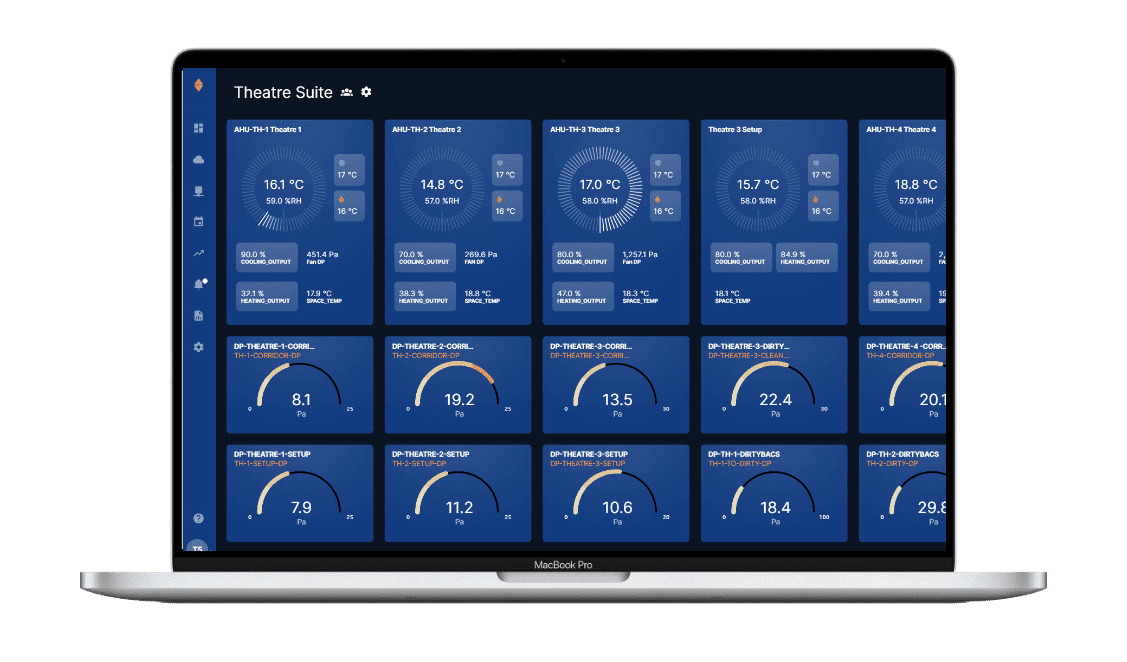
Professional Maintenance Services

- Expertise: Professional electricians bring a wealth of knowledge and experience to the table. They are well-versed in the complexities of electrical systems, ensuring that maintenance is carried out with precision and thoroughness. Their expertise allows them to identify and address issues that may go unnoticed by an untrained eye.
- Safety: Electrical work is inherently risky, and professional electricians prioritise safety. They adhere to industry standards and best practices to mitigate potential hazards during maintenance. This approach minimises the risk of accidents and ensures the safety of personnel and customers.
- Efficiency: Professionals work efficiently, minimising downtime and disruption to business operations. They are equipped with the necessary tools and resources to complete tasks promptly, reducing the impact on productivity.
- Compliance: Professional electricians are well-versed in local regulations and safety codes. They ensure that all maintenance work aligns with legal requirements, reducing the risk of non-compliance issues that can result in fines and legal complications.
- Comprehensive Solutions: Professionals offer holistic solutions, addressing not only immediate concerns but also anticipating future maintenance needs. Their approach focuses on long-term system reliability.
DIY Approaches
- Basic Tasks: DIY maintenance is best suited for basic tasks that do not require specialised knowledge, such as replacing light bulbs or power outlets. These simple tasks can be handled in-house to save costs.
- Cost Savings: In some cases, basic maintenance tasks can be cost-effective when handled internally. However, it's essential to be aware of the limitations of DIY maintenance and know when to seek professional assistance.
- Familiarity with the System: For businesses with employees who have a strong familiarity with the electrical system, minor troubleshooting and maintenance may be feasible. However, it is crucial to recognise when a situation requires professional intervention.

Seeking Professional Assistance

- Complex Issues: Any complex or potentially hazardous electrical issues should be left to the professionals. Attempting to address these problems without the necessary expertise can lead to safety risks and more extensive damage.
- Long-Term Strategy: For a robust, long-term maintenance strategy that considers the health and longevity of electrical systems, professional electricians are the preferred choice. They can implement preventive measures and comprehensive solutions.
- Legal Compliance: To ensure adherence to local electrical codes and safety regulations, professional assistance is essential. Non-compliance can lead to severe consequences for businesses.
Thus, while basic DIY maintenance can be suitable for simple tasks, there are clear advantages to enlisting the services of professional electricians for more complex and safety-critical electrical maintenance. A thoughtful approach, balancing the benefits and limitations of each option, is key to making an informed decision that ensures the optimal functioning and safety of a business's electrical systems.
Compliance with Electrical Standards and Regulations
Compliance with electrical standards and regulations is a fundamental aspect of operating a business in Adelaide, and indeed, in any urban area. These regulations are in place to safeguard the well-being of employees, customers, and the broader community, as well as to maintain the integrity and reliability of electrical systems. Expanding on this notion, we can consider the following points:
Adherence to Safety Standards
Electrical standards and regulations are established to set a minimum threshold for safety. They encompass guidelines for the design, installation, operation, and maintenance of electrical systems to prevent accidents, injuries, and property damage. Compliance with these standards is a non-negotiable commitment to the safety and well-being of everyone interacting with the business.
Legal Obligations
Non-compliance with electrical standards and regulations can have serious legal consequences. Businesses that do not meet these requirements may face fines, legal disputes, and operational disruptions. In the event of accidents or incidents resulting from non-compliance, businesses may also be held liable for damages or injuries.
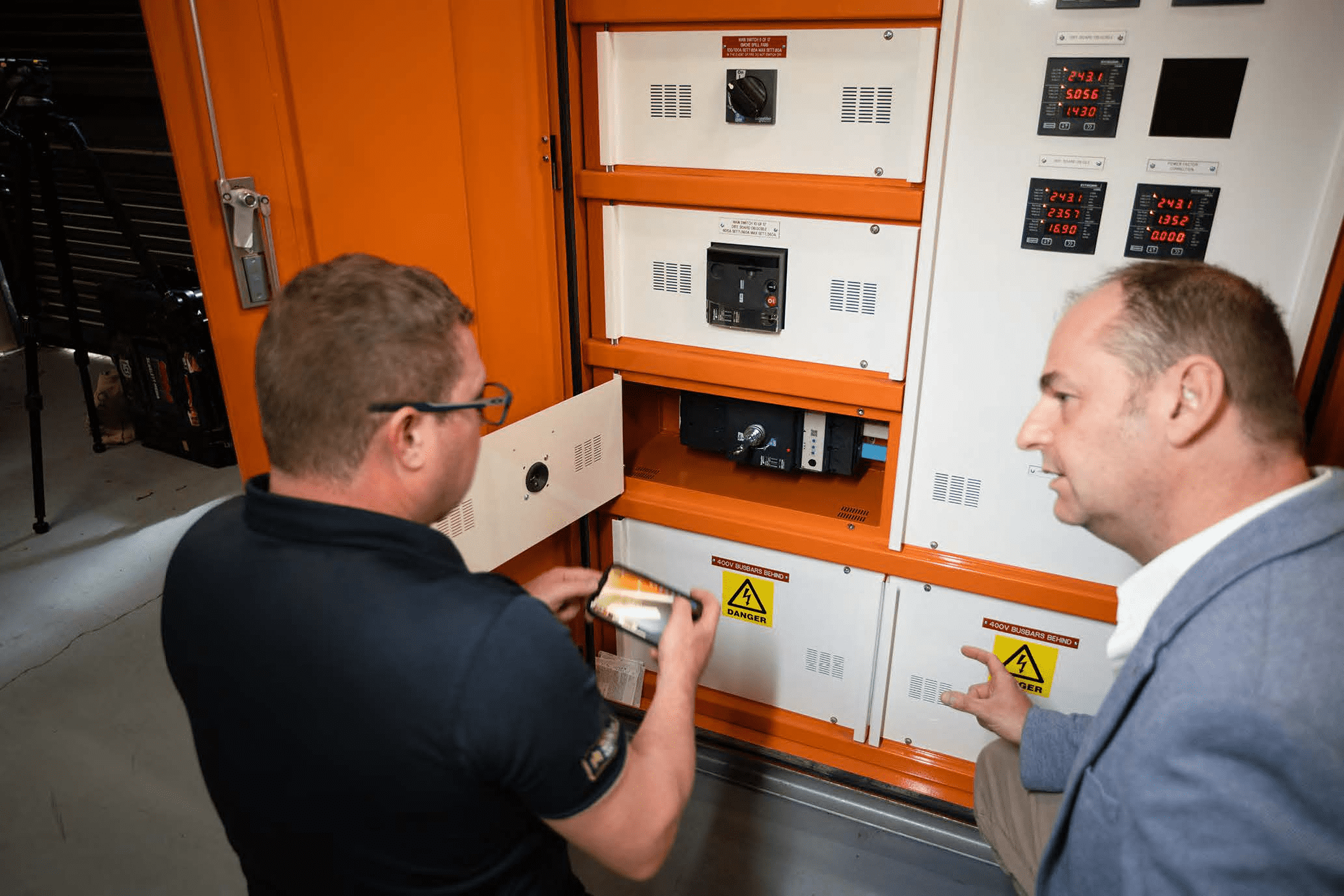
Insurance Implications
Insurers often require businesses to adhere to electrical safety regulations as a condition of coverage. Non-compliance can lead to the denial of insurance claims in the event of electrical-related incidents, resulting in substantial financial losses.
Reputation and Trust
Maintaining a reputation for safety and responsible operation is vital for businesses. Non-compliance with electrical standards can tarnish a company's image, leading to a loss of trust among customers, partners, and the community. Reputation damage can be challenging to recover from and may have lasting consequences.
Prevention of Electrical Failures
Compliance with regulations also aids in preventing electrical failures and costly downtime. Regular inspections and adherence to safety standards reduce the risk of equipment breakdowns, outages, and other disruptions that can harm productivity and customer service.
Environmental Responsibility
Adherence to electrical standards often involves energy efficiency measures, which not only reduce operational costs but also have a positive impact on the environment. Lower energy consumption contributes to a reduced carbon footprint and aligns with sustainability goals, an increasingly important consideration for businesses in the modern era.
In summary, compliance with electrical standards and regulations in Adelaide is not merely a bureaucratic requirement but a crucial commitment to safety, legal responsibilities, insurance coverage, and reputation. It is a proactive approach that supports businesses in safeguarding their operations, financial well-being, and the broader community while also promoting environmental responsibility. By embracing these standards, businesses in Adelaide can contribute to a safer, more responsible, and sustainable commercial environment.
The Impact of Technology on Electrical Maintenance
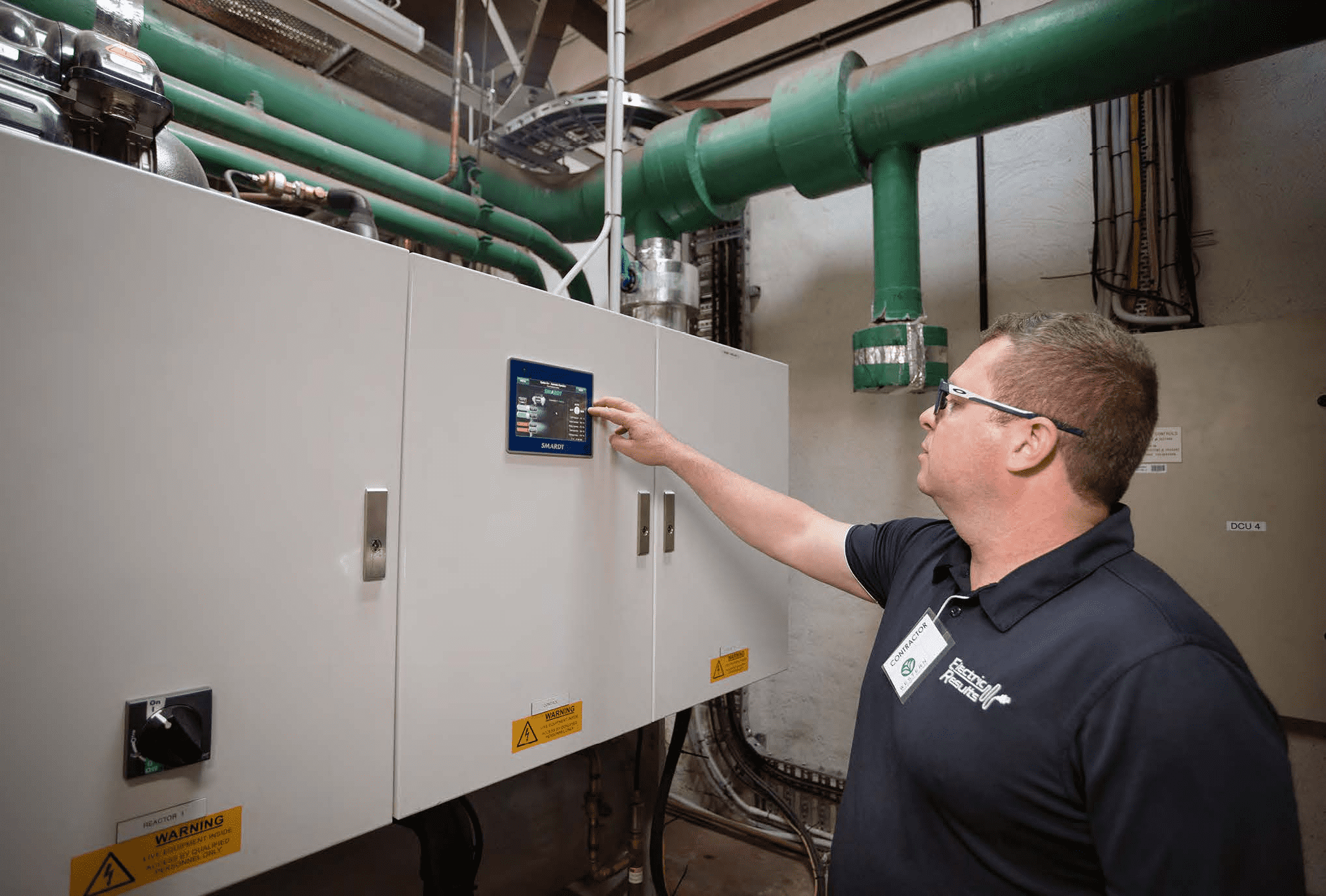
The influence of technology on electrical maintenance has been transformative, ushering in an era of increased efficiency and reliability. Here's a closer look at the impact of technology on electrical maintenance:
Data-Driven Predictive Maintenance
One of the most noteworthy advancements in electrical maintenance is the rise of predictive maintenance tools. These tools harness the power of data and analytics to forecast when electrical equipment is likely to fail. By analysing historical data, monitoring real-time performance, and employing predictive algorithms, businesses can now anticipate issues well before they occur. This allows for proactive maintenance, where potential problems are identified and addressed before they escalate into costly breakdowns. Predictive maintenance not only reduces downtime but also minimises repair and replacement costs.
Remote Monitoring and Internet of Things (IoT)
The advent of the Internet of Things (IoT) has enabled remote monitoring of electrical systems. Businesses can connect their equipment and systems to the internet, allowing for real-time monitoring and control. With remote access, maintenance professionals can identify and address issues from a distance, reducing the need for on-site visits and enhancing the speed of response. This remote capability not only saves time and resources but also supports immediate interventions in critical situations.
Enhanced Troubleshooting
Technology has equipped maintenance teams with advanced diagnostic tools. For instance, thermal imaging cameras can detect anomalies and hotspots in electrical systems, helping to identify potential issues before they become critical. These tools provide visual data that is instrumental in troubleshooting, and their accuracy minimises the risk of misdiagnosis.
Digital Documentation and Records
Technology has also simplified the documentation of maintenance activities. Businesses can now create digital records of maintenance tasks, inspections, and repairs. These records are easily accessible and searchable, enabling quick retrieval of historical data. This documentation serves not only as a reference for future maintenance but also as proof of compliance with safety standards and regulations.
Improved Communication and Collaboration
Modern technology facilitates seamless communication and collaboration among maintenance teams. Teams can share real-time data, images, and insights, allowing for better decision-making and more efficient resolution of issues. This collaborative environment promotes knowledge sharing and continuous improvement in maintenance practices.
In conclusion, the impact of technology on electrical maintenance is substantial. It has revolutionised the way businesses approach maintenance tasks, enabling proactive strategies, remote monitoring, and efficient troubleshooting. By harnessing these technological advancements, businesses can enhance the reliability of their electrical systems, reduce costs, and ensure the longevity of their equipment, ultimately contributing to the overall efficiency and success of their operations.
Energy Efficiency and Sustainability
Energy efficiency and sustainability have become increasingly critical considerations for businesses, and electrical systems play a pivotal role in achieving both these goals. Here's an expanded view of the connection between energy efficiency, sustainability, and well-maintained electrical systems:
Energy Efficiency and Business Profitability
Optimising electrical systems for energy efficiency is not only an environmentally responsible choice but also a financially prudent one. When electrical systems operate efficiently, they consume less energy, resulting in lower utility bills. These savings can significantly impact a business's bottom line, enhancing profitability and resource allocation.
Reduced Environmental Impact
Businesses that prioritise energy efficiency actively contribute to reducing their environmental footprint. Electricity generation is often associated with greenhouse gas emissions and environmental degradation. By consuming less energy, businesses reduce their carbon emissions, air pollution, and reliance on fossil fuels. This reduction in environmental impact aligns with global efforts to combat climate change and supports a more sustainable future.
Regulatory Compliance and Reputation
Many regions, including Adelaide, have regulations in place that require businesses to meet energy efficiency standards. Compliance with these standards is not only a legal obligation but also a reflection of a company's commitment to environmental responsibility. Businesses that adhere to energy efficiency regulations enhance their reputation, positioning themselves as responsible and conscientious organisations. This, in turn, can attract environmentally conscious customers, partners, and investors.
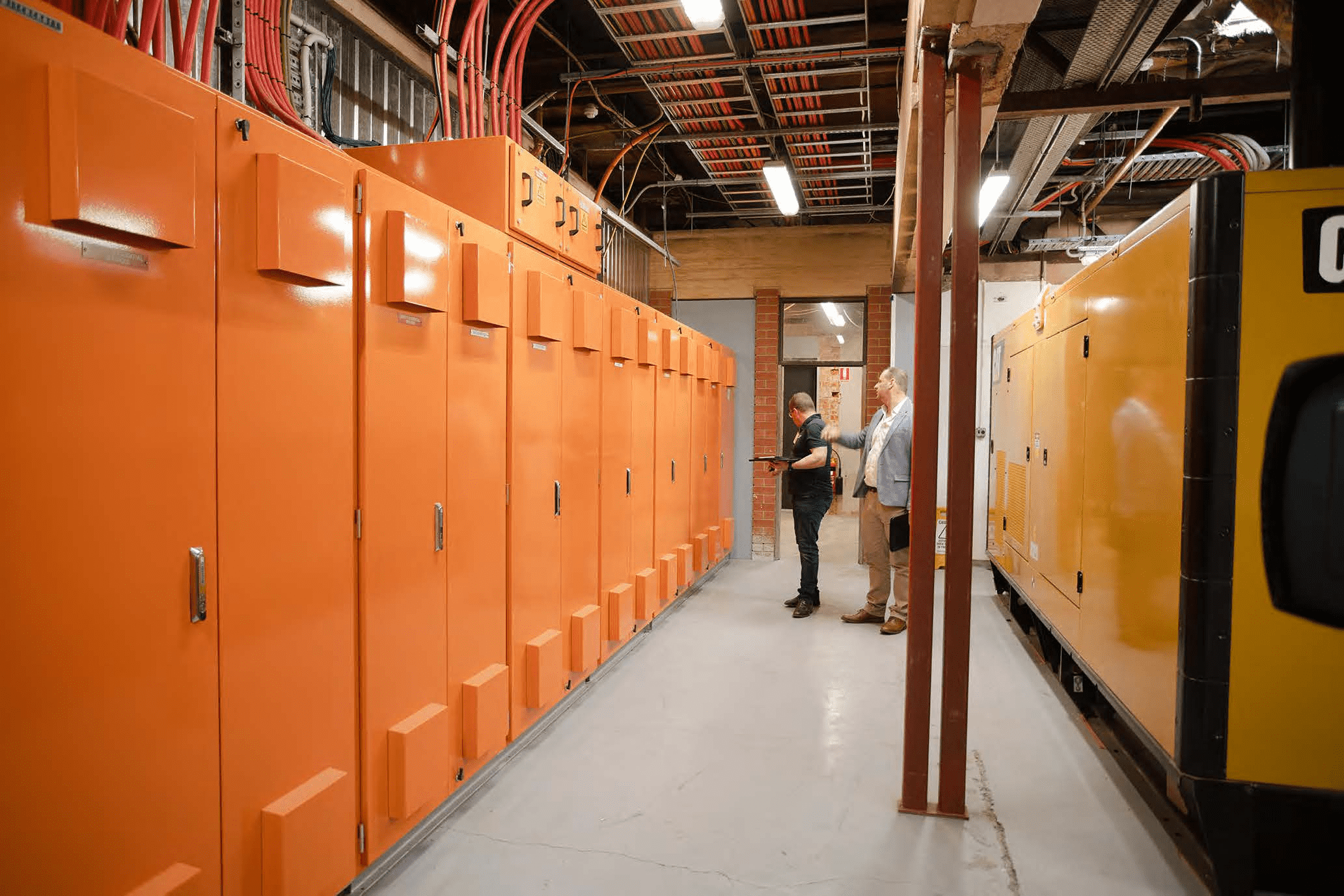
Long-Term Sustainability
Investing in energy-efficient electrical systems is a long-term commitment to sustainability. These systems are designed to minimise energy wastage and reduce the need for frequent replacements or upgrades. By extending the lifespan of electrical equipment, businesses reduce the demand for raw materials and the energy-intensive manufacturing processes required to produce new equipment.
Resource Conservation
Efficient electrical systems do more than just save energy; they also contribute to resource conservation. By reducing energy consumption, businesses lower the demand for natural resources used in energy production, such as coal, natural gas, and water. This conservation plays a vital role in ensuring the availability of resources for future generations and reducing the strain on ecosystems.
Positive Public Perception
Consumers are increasingly inclined to support businesses that prioritise sustainability. By embracing energy-efficient electrical systems, companies send a clear message to their customers that they are environmentally responsible and forward-thinking. This can lead to increased brand loyalty and positive public perception.
In summary, energy efficiency, sustainability, and well-maintained electrical systems are closely interconnected. Businesses that invest in energy-efficient electrical systems not only reduce operational costs but also contribute to environmental conservation, regulatory compliance, and a positive public image. As sustainability becomes a focal point for consumers, businesses, and governments, maintaining efficient electrical systems is a key step in ensuring a better, more sustainable future for Adelaide and the global community.
Cultivating Business Success in Adelaide:
Routine Electrical Maintenance with Electric Results
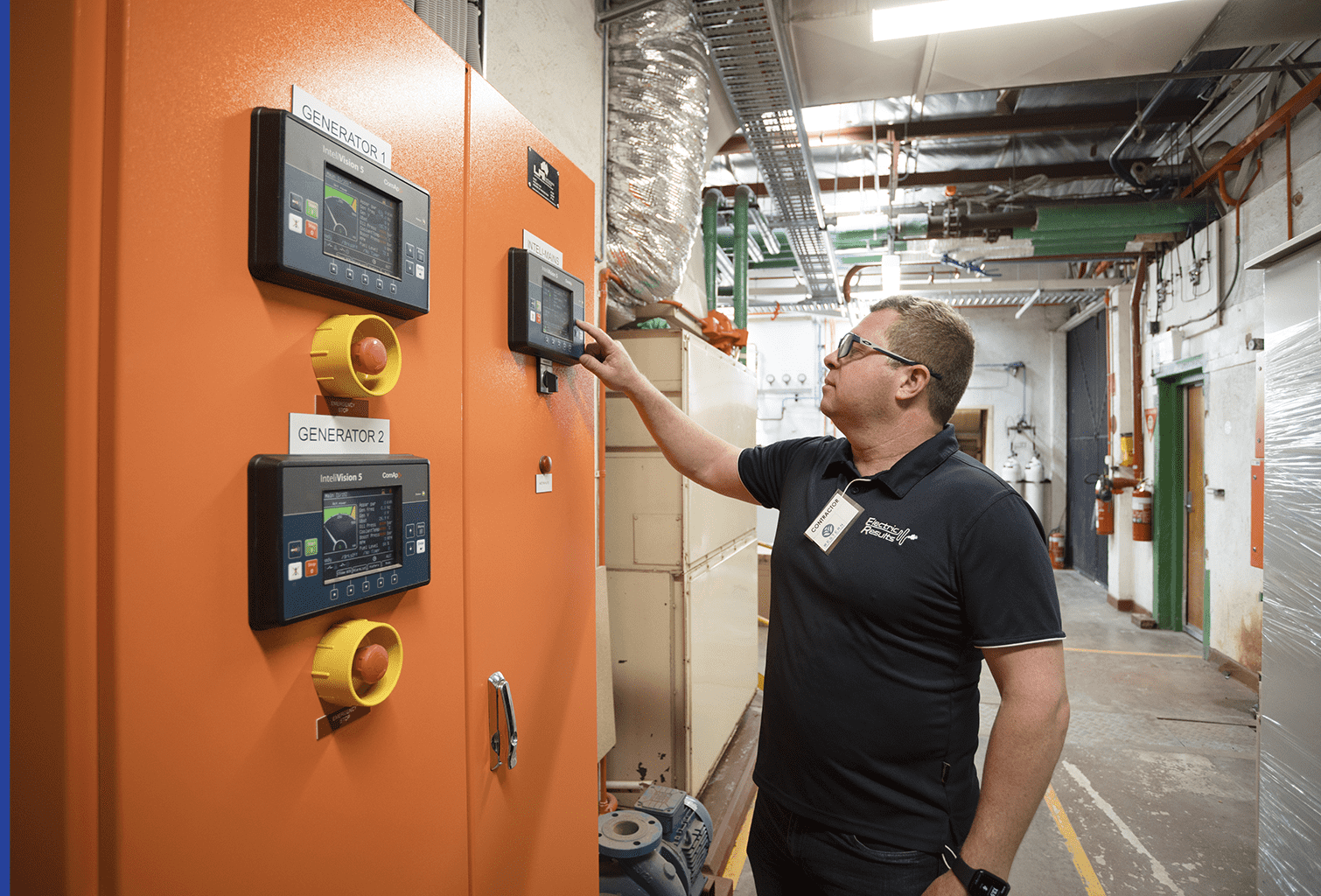
In conclusion, the importance of routine electrical maintenance in Adelaide's commercial sector cannot be overstated. It is not merely a recommended practice; it is an essential requirement for businesses to thrive and excel. The benefits are evident, encompassing enhanced safety, operational efficiency, and significant cost savings. As we navigate an increasingly technology-driven world, it is imperative to stay ahead of the curve in terms of electrical maintenance trends and innovations to remain competitive and sustainable.
At Electric Results (ER), we have built our company with a singular purpose in mind: delivering tangible "results" to our clients. Our commitment to excellence is not just reflected in our name; it is the essence of what we do. We understand that your time is valuable, and that's why we are dedicated to getting things done right the first time.
We are not merely a service provider; we are your proactive partner in success. We are passionate about identifying ways to add value to our client relationships, ensuring that you achieve your objectives efficiently and effectively. Our goal is to build lasting relationships based on trust, so you choose to work with us because you want to, not because you have to.
As we encourage businesses in Adelaide to prioritise routine electrical maintenance, we also extend an invitation to experience the Electric Results difference. Join us in contributing to a safer, more efficient, and more sustainable commercial sector. Contact us today to see how we can help you achieve your electrical maintenance goals and drive your business towards success.
